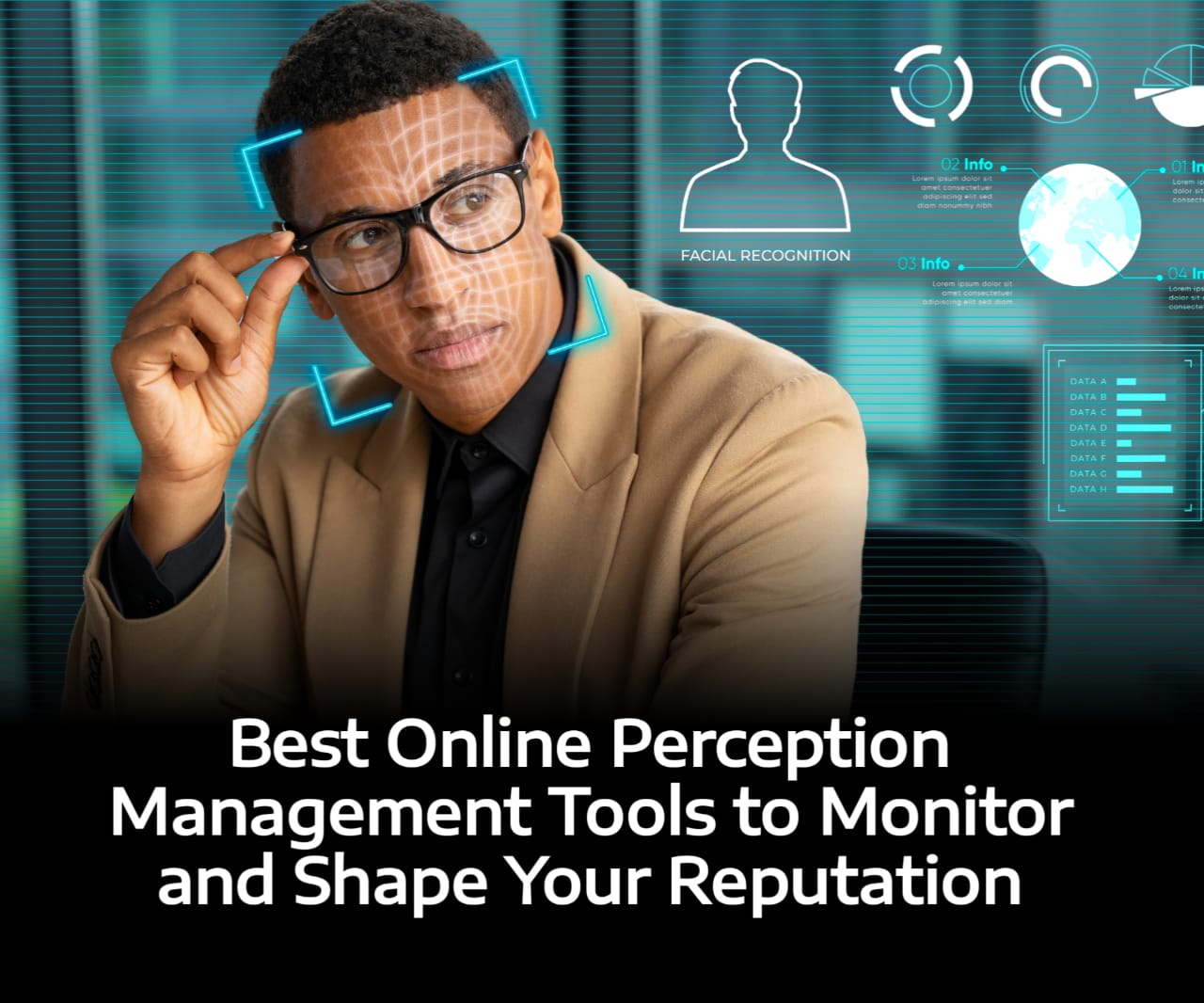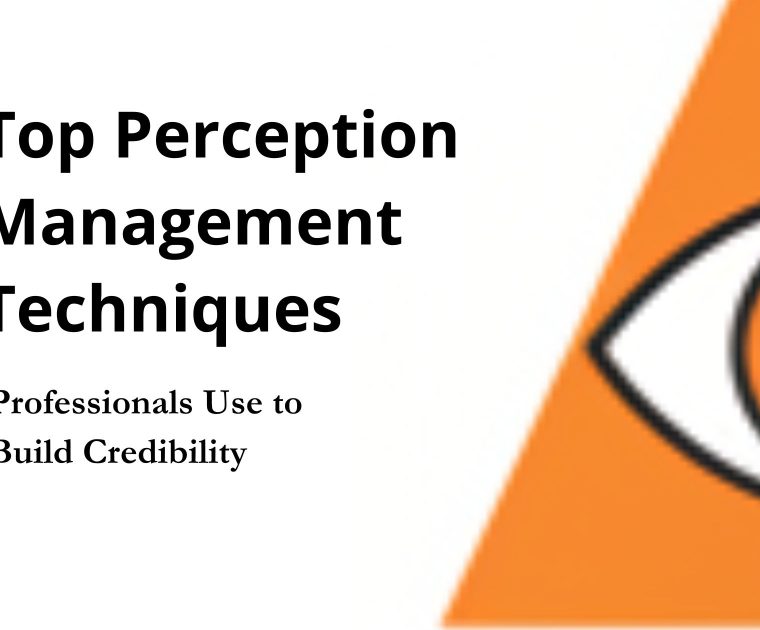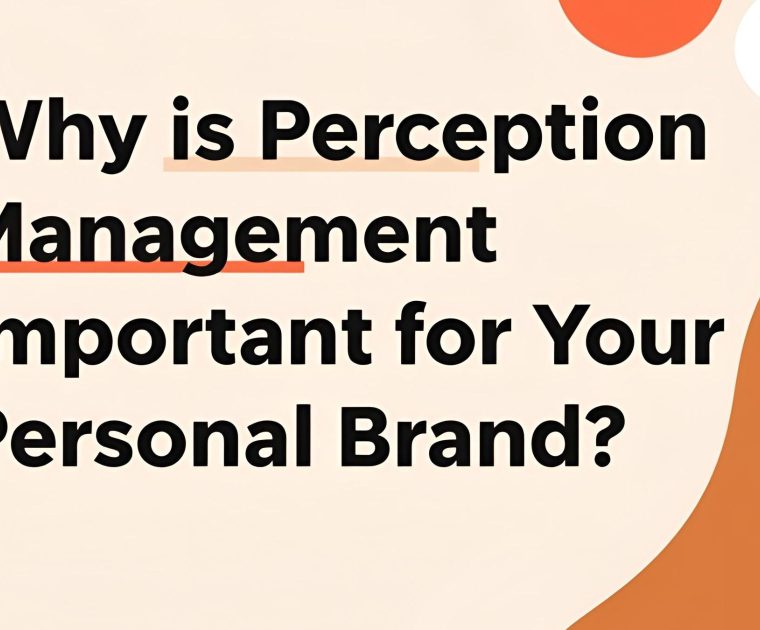In the 21st century, how you are perceived is paramount as it represents your digital currency. But one mistake professionals and brands make is reacting to perception when it’s too late, when a certain image has been absorbed by the public.
But perception isn’t just an emergency to be managed, it is an asset you cultivate intentionally because whether or not you believe it, your online reputation revolves around it.
What is perception management
Perception management is intentionally shaping what people see, think and say about you especially when you’re not in the room.
It is built and maintained through your professional profile, content and public interaction and is so important because when your public perception is on point, opportunities come to you easier as people have come to trust your authenticity, excellence and expertise.
Four Reasons why perception management matters for your brand.
1. Perception drives Trust
When someone stumbles on your profile, reads your content or even hears you speak, their mind begins to create an image about you. More often than not, they don’t need to interact with you personally to think about your personal brand in a certain way.
And when your perception is managed for excellence, people begin to trust in your ideas, your perspectives and your expertise.
2. Trust drives Conversion
Trust is built on bonding. When your perception, especially online, is in the right place, customers are more likely to build a cordial relationship with your brand.
According to research by Harvard Business School, when customers trust and bond with a brand, there is a 57% chance to increase spending with the brand and a 76% chance of choosing the brand over its competitors.
This means that trust, which directly stems from how you are perceived impacts conversion and whether or not opportunities are directed to you or your competitors.
3. Conversion drives Revenue
It’s no news that brand revenue is impacted by how well the conversion rate performs. You can have the following, engagement, visibility and even potential but if people are not taking action, your brand will stay stuck.
Conversion is where attention becomes valuable and that is why brands and professionals invest in messaging, positioning, storytelling and perception building. Because when conversion rises, revenue flows. When it doesn’t, you become stagnant.
4. Revenue drives Growth
This simple sentence summarizes the entire engine of successful businesses, startups or personal brands.
Revenue is not just income; it is a means of increasing your capacity through tools, systems, equipment, mentorship and expanded distribution. More revenue gives you the leverage to expand to bigger markets, improve your offers and increase your impact and all of this help you achieve the core goal: A brand that lasts.
All these pillars: Trust, conversion, revenue and growth rest on your perception.
So, perfection management is not an option; it is the foundation that determines how well your efforts become results.
Categories + Examples of Perception Management Tools.
Perception is not shaped in one place. It forms across platforms, conversations, reviews, search results and media mention.
To properly manage your perception across these channels, you need different categories of tools to monitor the multiple layers of your reputation.
From what the public says to what appears when someone searches your name, there are six core categories of perception management tools and each offer distinctive value.
1. Social listening and sentiment intelligence tools
Social listening and sentiment intelligence tools help you track and understand public conversations and the emotional drive behind them. They analyze online mentions across social media, blogs, forums and news sites.
They are important because they help you understand how people feel, not just what they say and detect any narrative forming so they are managed on time if need be.
Best Tools:
● Brandwatch
● Sprout Social Listening
● Hootsuite Insights
● Meltwater
2. Review and rating reputation tools
Review and rating reputation tools track and manage public feedback where buying decisions take place.
If you intend to sell your expertise especially through your personal brand, then you should understand that reviews aren’t just casual opinions, they are trust signals that influence conversions, brand credibility and referrals as one negative review unaddressed can influence dozens of potential customers.
Best Tools:
● Yelp (for service-based businesses)
● Trustpilot
● Google Business Profile Tools
● G2
● Capterra
3. Personal reputation monitoring
Personal reputation monitoring tools are how Founders, CEOs, Creators and Executives track mentions of their name, not just the brand. They help you understand how your image and story is interpreted by the public.
Today leadership influence is as important as brand influence because people work with people, not companies. These tools alert you of misquotes or negative rumors so they are managed accordingly.
Best Tools:
● Google Alerts
● Talkwalker Alerts
● BrandYourself
● Mention
4. Media monitoring and PR intelligence tools
Media and PR monitoring tools help track online and offline press mentions. You get to see what blogs, news sites, podcasts and even prints say about you.
This is important because, media coverages don’t just boost awareness, they influence your authority. With these tools, you can understand if news both online and offline aligns with the brand story you want to build.
Best Tools:
● Cision
● Muck Rack
● Prowly
● Google News Alert
5. Search engine perception tools
SEO is not just about visibility; it’s about what people see when they find you. Your search results are your first digital impression and according to a study, 80% of people trust brands more when it’s in the top search engine results.
These tools help you control the narrative and highlight articles, videos and posts that shape your perception.
Best tools:
● Ahrefs
● SEMrush
● Moz
● BrandYourself SEO Tools
6. Crisis detection and real-time risk tools
As stated earlier, it is not wise for you to sit and wait till there’s a problem to fix, especially regarding your reputation. This is where crisis detection tools come in, they help you spot potential problems before they escalate.
These tools alert you of small online signals: a negative comment gaining traction, a site showing negative interest in your personal brand and so on. These help you preserve your reputation before it plummets dangerously.
Best Tools:
● Dataminr
● NewsWhip
● Talkwalker Alerts
By actively tracking and monitoring your perception across difference channels that influence your reputation, you can note negative signals on time, align public opinionnwith brand story and preserve your reputation.
How to Choose the right perception management tools
Choosing the right perception tools is all about identifying what you want to understand.
● Do you want to understand what people say about your brand? Use social listening and sentiment intelligence tools.
● Do you want better insights into customer expectations? Use review and rating reputation tools.
● Do you want to see what the media has to say about you? Media monitoring and PR intelligence tools are the sure bet.
The right tools to use depend on your intent and purpose of information that you want to get.
Final Thoughts
Your reputation is not just what you say or think it is, it’s what is said about you in blogs, news sites, social media and other media materials.
The truth is this: Your perception especially online is either in alignment with your brand story or in conflict with it.
Perception management tools help you track and manage public opinions and make corrections if need be because more often than not, no matter what you say about yourself, if other people think differently, it affects your opportunities and growth over time.
Now you know the tools to use, you can take it a step further by downloading the free guide ‘Shaping Perception” to find practical strategies that help you align public opinion to your brand story.
FAQs
● What are perception management tools and how do they work?
Perception management tools are tools that help you track and stay up to date on how your personal brand is perceived by the public.
They are of different categories, while some track media mentions, some spot potential risks early and notify you.
● Are perception management tools the same as social media management tools?
Perception management tools are not the same as social media management tools.
While social media management tools help you track views, engagement and general feedback of your social content, perception management tools help you understand public opinions both online and offline.
● How do I know which perception management tool my business needs?
You have to first of all identify your biggest, most immediate perception priority.
- Do people misunderstand your brand? Use social listening and sentiment tools.
- Are you a founder or executive and you want to understand how the public perceives you? Use personal reputation monitoring.
- Do search results affect your credibility? See how to manage that with SEO reputation tools.
It’s advisable to use 2-3 categories for balance and better results. But this depends on your growth stage and intent of using the tools.
● Can perception management tools help clean up negative search results?
Perception management tools don’t ‘erase’ content, but they help you track narratives that need to be fixed and also highlight media materials that shape your brand perception.
● Are perception management tools enough to shape my brand’s reputation?
Perception tools provide you with the data, but data doesn’t always mean clarity.
They show you what people are saying but not how to respond in a way that protects and solidifies your reputation in the long run.
That’s where strategy comes in.
At Pandora, we help you connect these insights to the bigger picture so that you are provided with clarity, direction and strategies that produce measurable results.






Leave a Reply